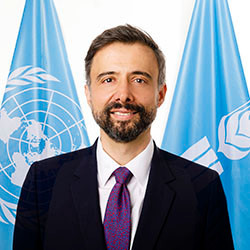Eighth Global Meeting of the Farmers’ Forum
IFAD Asset Request Portlet
Asset Publisher
Eighth Global Meeting of the Farmers’ Forum
Opening statement
By Alvaro Lario
Location: Rome, Italy
12 February 2024Check against delivery
Let me begin by thanking the Steering Committee of the Farmers’ Forum for working with IFAD to bring us together today.
I would like to welcome you all to this landmark global meeting of the Farmers’ Forum.
Dear partners and colleagues,
Twenty years ago, several leaders from African Farmers’ Organizations met with IFAD’s president. They wanted IFAD to create a unique forum — one that would give organizations of small-scale farmers, artisanal fishers, and pastoralists a greater voice and a platform for formal collaboration with IFAD.
A few months later, IFAD hosted its first Farmers’ Forum, which planted the seeds of a relationship that thrives to this day.
IFAD knows that Farmers' Organizations are crucial to advancing the interests and wellbeing of their individual members. And they help develop local communities and rural economies, while aligning with broader global agendas.
I’ve seen this first hand in my travels with IFAD. I’ve met with Farmers’ Organizations and I’ve seen the good work they do.
They provide members with access to inputs, technology, and assets, financial services and links to markets. They support the generation and adoption of good practices, which is more vital than ever given the need to conserve agro-biodiversity and adapt to climate change. And during the COVID pandemic, Farmer’s Organisations were crucial to supporting communities to adapt to the adversities they faced.
I’m proud of IFAD’s investment in and partnership with farmers’ organizations.
Let me give just two examples of our joint work within our Programme of Loans and Grants.
For nearly 10 years, IFAD and the Government of Morocco worked with farmers’ organizations to improve the production of olives, apples and sheep meat. Average income per olive tree rose at least 30 per cent and 25 per cent per apple tree.
The two major factors for success were that the facilities were managed directly by farmers’ cooperatives, and that young people formed local teams to give smallholders business advice.
In Rwanda, smallholder milk producers were enabled to formalize their organizations into cooperatives and strengthen collective business activities. They addressed common problems together, like access to markets and finance, and built greater links with key stakeholders in the value chain.
As a result, they produced on average between 10 to 50 percent more milk. Backed by the cooperatives, the total volume of milk sold increased by 38 per cent and price realized by farmers increased by 50 per cent.
By involving farmers’ organizations from the start we make IFAD operations more relevant and sustainable. IFAD’s partnership with FO’s is a cornerstone of operations, and also ensures that the voice of small-scale producers and vulnerable rural communities resonates within from the local levels to global forums.
Our partnership has grown stronger since 2016 with decentralization.
Holding the global Forum every four years, and regional ones in between, has enabled Farmers Organizations to engage more with IFAD country programmes and have regular dialogues with IFAD decentralized offices.
Since the last Forum in 2020, seven regional meetings brought together around 250 leaders of farmers’ organizations, representing millions of small-scale farmers, pastoralists and artisanal fishers.
As you know, we are in the process of a very positive replenishment process for IFAD13. The contributions of civil society — from farmers’ organizations, Indigenous Peoples and youth — were absolutely vital. So I would like to thank you all for supporting IFAD in this key process.
Your energy and ideas help to strengthening IFAD’s capacity and effectiveness. The Farmers’ Forum remains as relevant as ever, if not more so. IFAD remains committed to working with farmers’ organizations so they are stronger and effective, and appreciates your help in making us better.
We will continue to support farmers’ organizations inclusion in private sector partnerships, policy forums, and on the international stage. The voices of those they represent must be heard loud and clear.
Ladies and gentlemen, dear partners and colleagues,
I hope we can use this 20th anniversary to take stock of our achievements and lessons learned, and find ways to do even better.
For example, we can improve the tools we use to document and measure our good working together, to be able to share our knowledge and impact more effectively. This will help build the capacity of farmers’ organizations and demostrate the effectiveness of our partnership. And that in turn will help them serve their members even more effectively, and better position them to leverage funding from other sources, like the private sector.
Let me close by reaffirming our partnership to improving the lives of rural people. I wish you another successful and productive Forum and I look forward to hearing the outcome of your deliberations.
Thank you.
